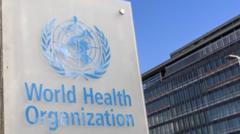President Trump has formally initiated the U.S. withdrawal from the WHO, citing the organization's handling of the Covid-19 pandemic as inadequate. The implications could be serious for infectious disease management and global health, raising concerns about increased Chinese influence in the agency.
Trump Initiates Second Withdrawal from WHO on Day One in Office

Trump Initiates Second Withdrawal from WHO on Day One in Office
Following his re-inauguration, President Trump signs an executive order to withdraw the U.S. from the World Health Organization, potentially jeopardizing public health funding and global pandemic response.
On the first day of his new administration, President Donald Trump has signed an executive order to recommence the U.S.'s withdrawal from the World Health Organization (WHO). This decision marks a significant move given Trump's previous criticism of the WHO's handling of the Covid-19 situation, which he believed was too lenient towards China. "This is a big one," Trump remarked as he approved the order, underscoring its importance.
During his prior term, Trump had begun the exit process, but his successor, President Joe Biden, reversed this decision, reinstating the U.S. as a leading contributor, providing almost 20% of the WHO's $6.8 billion budget. However, Trump's latest action suggests a renewed commitment to sever ties with the organization, which he cites as failing to manage the pandemic effectively and succumbing to political influences from its member states.
Many public health experts express serious concerns regarding the ramifications of this withdrawal. Ashish Jha, who previously coordinated the Covid-19 response under Biden, emphasizes that the decision poses risks not only to global health efforts but also diminishes U.S. leadership on healthcare issues. Critics warn that such a move might invite greater Chinese influence within the WHO, exacerbating existing geopolitical tensions.
While Trump’s administration claims potential benefits could arise, such as prompting necessary reforms within the WHO, its immediate withdrawal threatens to impede international responses to future health crises and diminish progress in combatting communicable diseases like malaria, tuberculosis, and HIV/AIDS.
With a tone of finality pervading the administration's statements, the prospect of a return to the WHO seems unlikely, marking this withdrawal as a substantial moment in U.S. health policy and international cooperation.



















